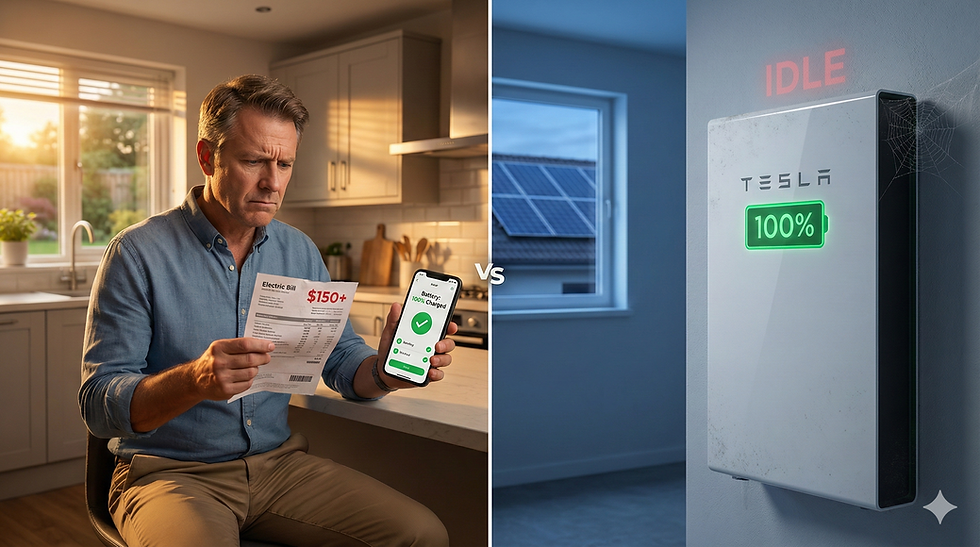Federal Tax Credit for Solar Panels in 2023
- ifeoluwa Daniel
- Aug 18, 2023
- 4 min read

The federal solar tax credit, already a game-changer, has just leveled up. Thanks to the Inflation Reduction Act of 2022, it's not just a reboot—it's a revolution.
Imagine getting a whopping 30% off the cost of installing those sleek solar panels and those high-tech storage batteries. Sounds dreamy, right? But it's not a dream. It's the Residential Clean Energy Credit, and it's here to make solar not just an eco-friendly choice, but a wallet-friendly one too.
So, if you've been on the fence about going solar, now's your moment. Dive into this guide, and let's unravel the ins and outs of the federal solar tax credit for 2023.
Residential Clean Energy Credit Highlights:
Opt for solar installations between 2022 and 2032 to claim a 30% tax credit on eligible expenses.
No ceiling on the expense amount you can claim.
Unused credit? No worries. Roll it over to subsequent tax years.
Bonus: Battery storage technology now also falls under this credit's umbrella.
What Is the Federal Solar Tax Credit?
Imagine harnessing the sun's power and getting a hefty discount, courtesy of Uncle Sam. That's the magic of the solar Investment Tax Credit (ITC) for you. Not just any incentive, the ITC is the government's way of giving you a high-five for choosing green energy. And with the recent tweaks from the Inflation Reduction Act, it's become an even sweeter deal.
So, what's the buzz about? The ITC, in its revamped 2023 avatar, generously slices off 30% from your solar installation costs on your federal income taxes.
Let's paint a clearer picture: Dive into a solar setup worth $30,000, and the ITC ensures you get a federal tax credit of $9,000. It's straightforward math, but the implications? Monumental. If you're staring at a $10,000 federal tax bill, this credit whittles it down to just $1,000. And if you're in the enviable position where your credit overshadows what you owe, simply roll the excess into next year's adventures.
What Expenses Does the Solar Tax Credit Cover?
First off, those shiny Solar photovoltaic (PV) panels that transform sunlight into electricity? Covered. That means the heart of your solar system gets a financial boost right off the bat.
But it doesn't stop there. All the behind-the-scenes work? We're talking contractor labor, the maze of permitting fees, and those other pesky costs that tend to sneak up on you... Yep, they're all under the umbrella of the tax credit.
Now, here's where it gets even more interesting: Storage batteries. These powerhouses store excess energy for those cloudy days or nighttime use. And with the tax credit's recent updates, they've got some new requirements, but they're still very much part of the deal.
And remember that magical 30% credit we talked about? It's not just a random figure. It's a solid chunk off all these eligible expenses. And the cherry on top? There's no upper dollar limit.
Whether you're going for a modest setup or an all-out solar extravaganza, the sky's the limit.
In essence, the solar tax credit isn't just a discount ticket—it's your all-access pass to a greener, more affordable energy future.
Who Can Get the Solar Tax Credit in 2023?
So, you've got your eyes on that juicy 30% solar tax credit, but there's that nagging question: "Is it for folks like me?" Let's see if you fit the bill…
First up, your residence. Whether it's the cozy home where you kick up your feet every evening (your primary residence) or that weekend getaway spot (secondary residence), both are in the game. But here's the catch: it's got to be on U.S. soil. So, that dreamy beach house in Bali? Sadly, it won't make the cut.
Now, let's talk dollars and cents. Got taxable income? That's a green light. And whether you're the kind who meticulously itemizes every tax detail or someone who breezily takes the standard deduction, the solar tax credit doesn't discriminate. It's got your back either way.
But here's where you need to pay attention: the equipment. It's got to be fresh out of the box, ready for its debut. And if you're thinking batteries, they've got to pack a punch—think 3 kWh or more.
Remember, this 30% treat is up for grabs from 2022 to 2032. But, like all good things, it's got an expiration date. By 2034, it'll be history. So, if you're eyeing 2023, make sure your system's up and running by December 31. No exceptions.
Still in a muddle? Unsure if you qualify? Request a free solar quote, and our team will light the way, guiding you through every twist and turn of the eligibility maze.
How Long Does the Solar Tax Credit Last?
Alright, let's get real. You're eyeing that 30% solar tax credit, but there's a ticking clock, isn't there? So, how long do you have before it all ends?
Here's the lowdown: That sweet 30%? It's yours to claim until the ball drops on Dec. 31, 2032. But as the calendar flips, things change. By 2033, the credit dips to 26%. Fast forward to 2034, and you're looking at 22%. And come 2035... well, unless Congress has a change of heart, it's curtains for the credit.
Now, here's a twist: Remember the older law that was set to bow out in 2024? The one that promised a 26% credit this year and 22% in 2023? The new Residential Clean Energy Credit has gracefully waltzed in, pushing that old law into the shadows.
So, what's the big picture? With the Residential Clean Energy Credit in play, the next decade looks sunnier for homeowners. It's not just about savings; it's about making a powerful choice for the planet. And as for us? We're here, ready to guide you every step of the way, from financing to flawless solar design.
Wondering how to navigate these changes? Reach out for a free solar quote. Let's make your solar dreams a reality before the clock runs out.
FAQ
How to Claim the Federal Solar Tax Credit?
To claim the Federal Solar Tax Credit, fill out IRS Form 5695 and submit it with your annual tax return. The credit amount will be deducted from your federal tax liability.
How Does the ITC Impact Other Solar Panel Incentives?
The ITC can be combined with other solar incentives, enhancing overall savings. However, always check local and state incentives, as some might adjust based on the ITC's application.
What is the future of the federal solar tax credit?
The federal solar tax credit is set at 30% until 2032. It will decrease in subsequent years, with potential phase-outs post-2035 unless Congress extends or modifies it.



